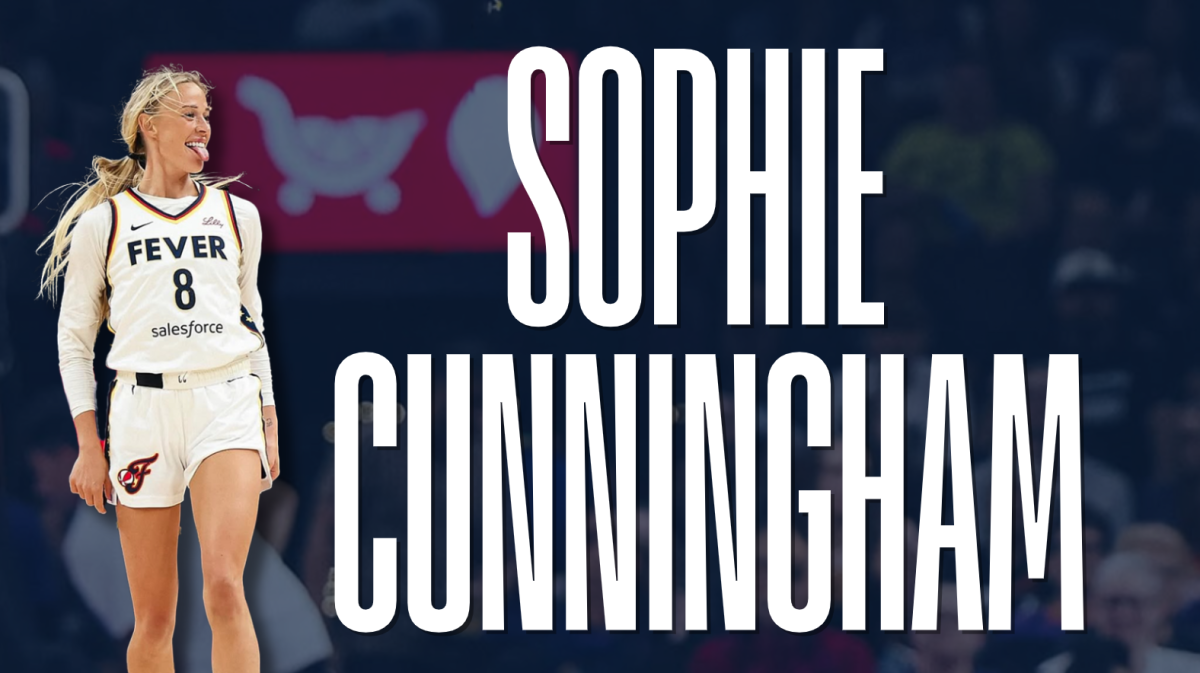Indiana Fever guard Sophie Cunningham has recently become the hot topic up for debate in the Women’s National Basketball Association (WNBA). Her hard foul on Connecticut Sun rookie Jacy Sheldon, which was retaliation for earlier contact with Caitlin Clark, earned Cunningham an ejection, a surge of social media attention and the unofficial nickname “The Enforcer.” On one level, Cunningham’s instinct to stand up for a teammate is admirable. Athletes should support one another when the game gets physical or tensions rise. Yet her choice to do so through a deliberate, violent foul undermines both her team and the sport itself.
The game of basketball is emotionally charged. Players get completely engrossed in the moments from play to play, and contact is inevitable. Cunningham went beyond competitive toughness into unsportsmanlike behavior when she chose to strike back. That foul did more than just end a play; it intensified the conflict and could have been dangerous. Retaliation rarely resolves conflicts; instead, it encourages more hostility, raises the possibility of injury and diverts players’ attention from winning the game. Like all professional leagues, the WNBA has regulations in place to stop this kind of escalation. In addition to harming Sheldon, Cunningham’s violation of those regulations put her own team at a disadvantage for the rest of the game.
The aftermath of her actions proves the point. Cunningham’s ejection didn’t resolve any tensions; it fueled them. Months later, she suffered a season-ending knee injury, and some speculate it was payback for that earlier foul. Whether or not the injury was intentional, it highlights the cycle of retribution that retaliation naturally encourages. Instead of ensuring her teammates’ safety, Cunningham may have invited more danger for everyone on the court, including herself, due to acting on impulse and emotions.
Still, it would be unfair to dismiss the importance of loyalty and protection in team sports. Teammates should absolutely support one another, especially when they feel that referees are missing dangerous plays. No one wants to watch a star player like Clark take repeated hard hits with no response, but that response can take many forms. Rallying the team’s focus and morale, demanding tighter officiating or outplaying the opponent with skill and discipline are far more effective and mature ways to send a message.
Cunningham’s defenders pointed out her martial arts background and general toughness, qualities that clearly fuel her competitive spirit. ESPN host Pat McAfee even praised her for “taking a foul to defend Clark,” suggesting that this risky violation is what proves her devotion. There’s no question that passion for your teammates is valuable. But in professional basketball, where players are role models and the stakes are high, passion must be balanced with control. Cunningham’s black belt in taekwondo may give her discipline in the dojo, but on the court, she chose to put on a show over restraint. Was this a show that people enjoyed?
Perhaps most striking is how Cunningham’s popularity skyrocketed after the incident. Within days, she had gained over 500,000 followers on TikTok and 300,000 on Instagram. Social media thrives on conflict, and Cunningham became a viral character: “The Enforcer,” the bold protector. That popularity says as much about our culture as it does about her. Fans often reward outrage and controversy with shares and likes, turning a dangerous foul into entertainment. But professional athletes cannot let social media dictate their behavior.
Players who chase online attention take the chance of letting public opinion overshadow their responsibility to their team and to the game itself. A hard foul that injures an opponent should never be a path to fame. Social media applause can be fleeting; injuries and suspensions can last far longer. Cunningham’s rising follower count might boost her brand for now, but it doesn’t help the Fever win games or keep their players healthy.
Sports history shows that leadership and toughness don’t have to come from violence. Legends like Tamika Catchings or Sue Bird earned respect through consistency, strategic play and the ability to inspire teammates without cheap shots. They proved that you can defend your team’s dignity while honoring the sport’s integrity.
Cunningham herself once said in an interview, “I’ll always have my teammates’ backs, but you have to be smart about how you do it.” That sentiment is exactly right, and exactly what she failed to embody during that game against the Sun. Standing up for your teammates is essential, but true loyalty means keeping them out of harm’s way, not plunging them deeper into it.
In the end, the question isn’t whether professional basketball players should defend their teammates; of course they should. The real question is, how?
Cunningham’s rise in social media popularity may tempt other athletes to court controversy for attention. But the WNBA’s future depends on players who choose skill over spectacle and restraint over retribution. Fans, too, have a role to play by rewarding excellence, not escalation.
Supporting teammates is non-negotiable. So is respecting the game. Cunningham’s decision to retaliate may have won her a wave of followers, but it cost her credibility as a professional and undermined the very principles that make team sports inspiring. True protection of a teammate is not about punishing an opponent; it’s about elevating your own play and proving, with every possession, that your team can win without crossing the line.
Leah Renshaw, FCRH ‘27, is a film and television major from Oakland, New Jersey.









































































































































































































